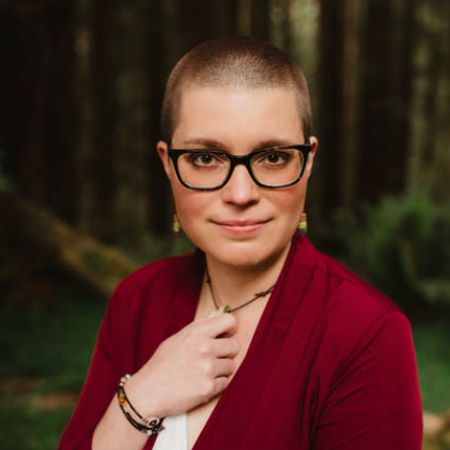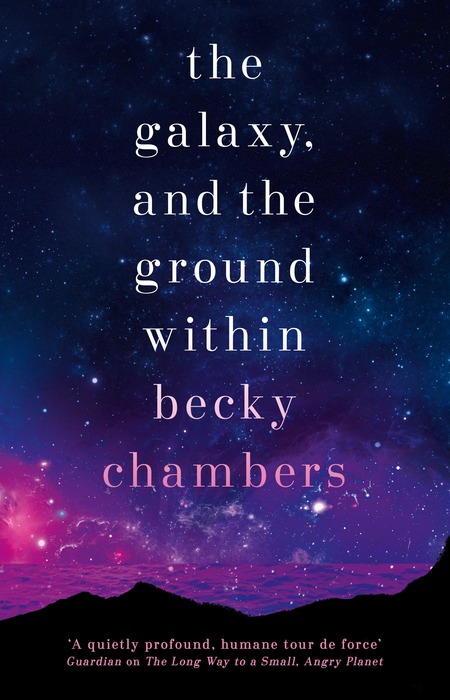Diving into any of Becky Chambers wondrously good books is to enter a literal universe of rich possibility and exquisitely well-realised humanity (even when the characters are anything but) that engages you from the get-go and doesn’t let you go until the very end of each thoughtfully-written and insightfully emotive story.
Her Wayfarers series in particular, which includes The Long Way to a Small, Angry Planet (2015), A Closed and Common Orbit (2016), Record of a Spaceborn Few (2018) and now, in conclusion, The Galaxy, and the Ground Within, have taken its readers to some extraordinary places but also, most importantly in a series which emphasises self-discovery and worth and charting your own distinctive and valuable path, revealed a great deal about what makes someone the person they are.
It’s been a fascinating journey with a rich cast of characters, all of whom in some way or another, have worked hard to forge a place for themselves in an often hostile and orthodoxy-enslaved galaxy and who have created a place in every reader’s heart as a result.
The Galaxy, and the Ground Within, which reunites us in part with characters from The Long Way to a Small, Angry Planet, chiefly Pei the Aeluon, a member of a species which primarily communicates through colour changes on its silverys scaled skin, continues Chambers’ luminously-rich exploration of what it means for people from a range of cultural backgrounds, sexual identities and personalities to find themselves, both in isolation and as part of a wider grouping.
“One of these domes, on a flat plain in the southern hemisphere, encased a modest-sized establishment. Its name — as was painted in a wreath of multiple languages on the shuttlepad outside – was the Five-Hop One-Stop.
It was Ouloo’s self-appointed mission to make you want to land there.” (P. 6)
In this case, that grouping is a band of individuals who are trapped on the highly ordinary desert planet Gora (its main claim to fame are the planets it allows travellers to get to y virtue of where it sits on the transport network) when a highly-unusual technological failure sees them unable to continue their journeys through the carefully laid-out network of wormholes that connect the many worlds of the Galactic Commons (GC), a Federation-esque galactic grouping that has brought a significant amount of peace and order to a complex and often restive region of space which also includes Humans who, having trashed Earth, are wanderers for the most part aboard generation ships.
But Humans are not the focus here; instead, Chambers introduces again to Pei, who is a supplies runner for the Aeluon military and who is involved in an unsanctioned relationship with a Human (a big no-no in her culturally rich but somewhat fossiled society), to Roveg, a Quelin who has been exiled at great cost from his highly authoritarian, xenophobic world for speaking his mind and soul, and Speaker, who is never far from her sisterly twin and whose people, the Akarak, are centuries-old victims of colonisation and genocide who have found a way to forge an existence on the margins of GC society but at the expense of the kind of acceptance that comes naturally to other species such as the Aeluon and the Laru.
It is the latter species who host the Five-Hop One-Stop, a hotel of sorts that offers accommodation, permits and a range of necessary supplies and which is the pride and joy of Ouloo and her child Tupo.
Ouloo is a gem of a character, an intuitive and inclusive female Laru – in a nod to the queer sensibility that infuses the entire series, Laruan gender is something that is only revealed in the latter stages of adolescence and is not fixed in any way with every part of the spectrum open and accepted; it’s part of a wider GC cultural code which sees “xe” and “xyr” used instead of gender-based pronouns – who is constantly seeking out ways to make her guests feel welcome in ways that supersede ordinary ideas of hospitality.

It is indeed fortunate for Roveg, Pei and Speaker that they end up under Ouloo’s fervently welcoming roof for as The Galaxy, and the Ground Within tells its nuanced and compelling tale of a found family of sorts, with the dysfunction and functional caring that involves, it becomes clear that they won’t be going anywhere too quickly as Goran authorities do their best to fix the mess their technology has created.
What really makes this novel so memorable is the way in which Chambers gently but authoritatively brings these quite disparate beings together and how she illustrates in way that feel weighted and substantial and anything but trite, how people who are manifestly different can still find some place of commonality.
Best of all, she doesn’t pretend it will all end up as some sort of kumbaya fairytale where everything is perfect and everyone gets along without issues of any kind.
It’s this willingness to be warmhearted and inclusive and yet also honest and realistic that grants The Galaxy, and the Ground Within so much of its richness as a novel; no one is perfect, not in any galaxy or on any planet and Chambers acknowledges this all while softly, softly preaching the gospel of inclusivity, mutual respect and difference.
“Ouloo beamed. ‘Ha!’ she said. ‘Oh, I like that. I’m keeping that.’ She sat glowing for a moment, then got to her feet and hurried over to the others, doing a waving dance as she went. Roveg let out a clicking cheer, Tupo laughed, and the three of them danced all the harder, an unaccountable number of limbs trampling the formerly pristine lawn.
Speaker smiled, turned up the music, and joined them.” (P. 172)
The world of The Galaxy, and the Ground Within is one we’d all like to live in; at least, those of us who know what it is like not to be in the mainstream and who understand all too well how important it is to be loved and included and cared for unconditionally.
In Ouloo’s oasis, all this happens and more, but like anywhere, it is not perfect and so you never feel like you are being sold an impossible fairytale but rather one that has every chance of existing since these five beings, all very different from each other (yes even mother and daughter/son/non-gender), manage to find common ground on which to relate and in most really like and care for each other.
While Pei, Speaker and Roveg, and even the Laruans, are quite literally at a crossroads since that is Gora’s main reason for being, they are also, it turns out, at an existential one, and through narrative twists compellingly substantial and affectingly small, we bear witness to their journeys from who they were to who they become, all over the course of five transformative days.
The Galaxy, and the Ground Within is a brilliant science fiction novel because it does what the genre does best – it delves deep into what makes us who we are, and how that is constrained and liberated by the world around us, and how hard and yet liberating it can be to be true to yourself.
There is a great deal about this queer gem of a book that will delight and enthrall you and get you thinking; The Galaxy, and the Ground Within is a celebration of the power of difference and uniqueness but also how by being open to including a vast panoply of possibility in our lives, both personal and societal, we can find heartwarming richness and truth in concert with us that will change our lives, for the better, forever.
